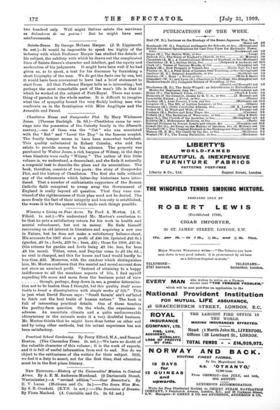• Winning a Living on Four Acres. By Fred. A.
Morton. (A. C. Fifield. ls. net.)—We understand Mr. Morton's conclusion to 'be that he gets a satisfactory return for his work in health and mental refreshment, but not in money. He finds himself recovering an old interest in literature and acquiring a new one in Nature, but he does not make a satisfactory balance-sheet. His accounts for 1907 show a profit of 440 10s. (printed 441 8s.) (garden, 48 5s.; fowls, 428 5s.; bees, 44) ; those for 1908, 445 6s. (the returns for garden and fowls being 43 14s. less, for bees 4.8 10s. more). Tithes, rates, and Dog-tax come to 43 18s. 6d. ; me rent is charged, and this for house and land would hardly be less titan 425. Moreover, with the candour which distinguishes him; Mr. Morton confesses that the mental and moral account does not show an unmixed profit. " Instead of attaining to a happy indifference to all the mundane aspects of life, I find myself regarding life more and more from the business point of view • . . . • . though, perhaps, deep down in me, a greater determina- tion not to be beaten than I thought, but this quality itself seems liable to breed a dissatisfaction with simple modes of life." This is just what David Harum says: "Small farmin' ain't cal'lated to fetch out the best traits of human nature." The book is full of interesting practical details. One of these touches the poultry-farm question. On the whole, the experience is adverse. An uncertain climate and a quite nndiscoverable idiosyncrasy in the animals make it a very doubtful business. Mr. Morton thinks that he might have done better on other soil and by using other methods, but his actual experience has not been satisfactory.






































 Previous page
Previous page